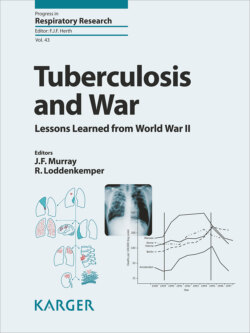Читать книгу Tuberculosis and War - Группа авторов - Страница 60
На сайте Литреса книга снята с продажи.
TB Control during War
ОглавлениеDuring the war, medical services for the general population were frequently reduced or disrupted. In particular, a shortage of experienced TB personnel did result, many doctors and also nurses were drafted into the military service. TB sanatoria and hospitals were used for wounded soldiers, thus often substantially reducing the number of beds for TB patients. Patients had to be discharged, thus facilitating the spreading of the TB bacilli into the population. Transportation became difficult and was doubly injurious to TB care, preventing patients from going to clinics or dispensaries for diagnosis and treatment, and impeding TB nurses to visit the homes of patients to give advice and provide home care.
The governments often instituted committees composed of TB specialists who developed strategies to maintain TB services and to improve the condition of TB patients. Special attention – as far as possible – was devoted to providing adequate nutrition and accommodation. Educational information on precaution against TB was provided to the public, guidelines for doctors were developed, and teaching of TB in medical schools intensified. Directives against the spread of TB in schools, kindergarten, and similar institutions were decreed. In countries suffering from air raids, shelter conditions were improved to prevent droplet infection. If possible, separate bunkers and/or masks for TB patients were provided. Children (and TB patients) were evacuated from the cities to the countryside. For patients with an artificial pneumothorax, the refilling with air was ensured.
As often a shortage of workers developed during the war, even patients with active TB were used by the industry. This could have a negative impact on the course of the disease and limited the provision of medical care to the patients. In the Soviet Union, to secure care for patients, night sanatoria were established in which the patient received special supervision and treatment after finishing work.
